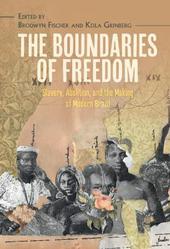
|
The Boundaries of Freedom: Slavery, Abolition, and the Making of Modern Brazil
Hardback
Main Details
| Title |
The Boundaries of Freedom: Slavery, Abolition, and the Making of Modern Brazil
|
| Authors and Contributors |
Edited by Brodwyn Fischer
|
|
Edited by Keila Grinberg
|
| Series | Afro-Latin America |
|---|
| Physical Properties |
| Format:Hardback | | Pages:329 | | Dimensions(mm): Height 235,Width 157 |
|
| Category/Genre | Slavery and abolition of slavery |
|---|
| ISBN/Barcode |
9781108831536
|
| Classifications | Dewey:306.3620981 |
|---|
| Audience | | Tertiary Education (US: College) | |
|---|
| Illustrations |
Worked examples or Exercises; Worked examples or Exercises
|
|
Publishing Details |
| Publisher |
Cambridge University Press
|
| Imprint |
Cambridge University Press
|
| Publication Date |
17 March 2022 |
| Publication Country |
United Kingdom
|
Description
The Boundaries of Freedom brings together, for the first time in English, key scholars writing on the social and cultural history of Brazilian slavery, emphasizing the centrality of slavery, abolition, and Black subjectivity in the forging of modern Brazil, the largest and most enduring slave society in the Americas. Nearly five million enslaved Africans were forced to Brazil's shores over four and a half centuries, making slavery integral to every aspect of its colonial and national history, stretching beyond temporal and geographical boundaries. This book introduces English-language readers to a paradigm-shifting renaissance in Brazilian scholarship that has taken place in the past several decades, upending longstanding assumptions on slavery's relation to law, property, sexuality and family; reconceiving understandings of slave economies; and engaging with issues of agency, autonomy, and freedom. These vibrant debates are explored in fifteen essays that place the Brazilian experience in dialogue with the afterlives of slavery worldwide.
Author Biography
Brodwyn Fischer is Professor of Latin American History at the University of Chicago. She has won awards from the Social Science History Association, the Urban Studies Association, the Brazilian Studies Association, and the Conference on Latin American History. She has authored two books, A Poverty of Rights and Cities from Scratch. Keila Grinberg is Professor of Latin American and Atlantic History at the University of Pittsburgh. She is a specialist on slavery and race in the Atlantic World. Her book A Black Jurist in a Slave Society was a finalist for the 2020 Frederick Douglass Prize.
Reviews'This pathbreaking volume reveals and refines the signature methods that have placed the 'Brazilian school' at the forefront of Latin American historiographies of slavery, abolition, and post-emancipation societies. Moving nimbly between broad processes and lived experience, contributors offer new perspectives, from the South Atlantic, on the urgent question of how dynamics rooted in slavery persist so powerfully after slavery's end.' Paulina L. Alberto, author of Black Legend: The Many Lives of Raul Grigera and the Power of Racial Storytelling in Argentina 'The Boundaries of Freedom makes available in English the best scholarship being done on slavery, emancipation, and their legacy in Brazil. The themes of illegal enslavement, the precariousness of freedom, and the afterlives of slavery are Atlantic in scope, thus inviting dialogue and comparison with studies on slavery and race in the US and the Caribbean.' Sidney Chalhoub, Harvard University 'A remarkable volume on the end of Brazilian slavery by some of the best scholars who write on that subject. They examine the complexities and social costs of slavery and abolition not only on politics, law, and economy, but also on the culture and the intimate lived experience of all touched by slavery and its heritage of racism. Required reading for anyone interested in slavery's legacy in the Atlantic world.' Stuart B. Schwartz, Yale University 'Throughout the nineteenth century, Brazil was simultaneously home to an economy still dependent on enslaved labor and the transatlantic slave trade, and a rapidly growing free population of African descent. These extraordinary circumstances are the basis for the complex and fascinating histories of struggle over questions of liberty, property, and identity that fill the pages of this exciting collection of essays.' Barbara Weinstein, New York University
|